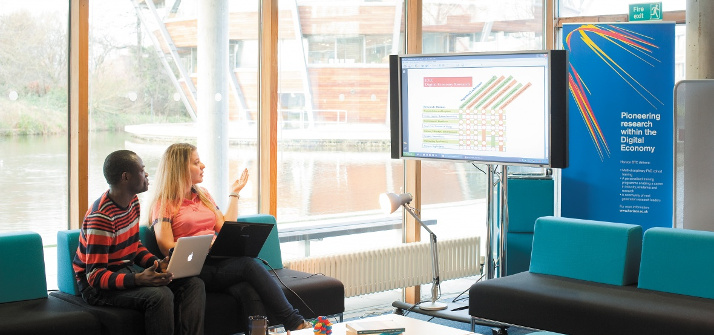Computer Science

As a computer science graduate, you will be equipped with a range of technical and transferable skills that are highly valued by employers and will enable you to progress into a number of different career areas.
According to Prospects Luminate ‘what do graduates do?’ 2023 report, the 2019/20 Graduate Outcomes data shows that graduates from technology and engineering disciplines have higher full-time employment rates than the all-graduate average (57.3%). More than two-thirds of IT professionals (67.7%) were in roles related to their degree. With more technology vacancies being advertised over the last year than in any other sector, it shows the high demand for these skills.
It also shows that computer science graduates working at graduate level, tend to move into roles such as:
- programmers and software development professionals
- IT user support technicians
- IT business analysts and systems architects among others
Cyber security professionals look at the top in demand IT skills in 2023.
What skills will I gain during my degree?
In addition to subject-specific knowledge, and developing an understanding of the core skills required, your computer science degree will equip you with a range of transferable skills including:
- high levels of computer literacy
- excellent numerical reasoning skills
- practical problem solving
- the ability to analyse and interpret data
- written and oral communication
- exceptional technology knowledge and skills
- critical thinking
- creativity
- computer and technology knowledge
- the ability to organise and classify large amounts of information
- the ability to work methodically and accurately.
How can I develop my skills and gain experience during my degree?
Due to the range of career options and sectors open to you, it is important to consider your options early on in your course and look for opportunities to gain relevant experience and skills. As well as improving your CV, gaining experience can also help you to make choices about your future career.
Work experience
Depending on what area of work or role you might be interested in, and where, there will be specific strategies, from speculative applications to formal processes you need to be familiar with. Gradcracker offers specific IT internships.
Also think about completing a year in industry placement as part of your degree.
Work experience - what, how and when
Year In Industry
The industry year lets you take what you've learned and apply it to real projects in industry. Placements are usually paid and can even lead to a job offer before you've graduated. Please speak to the Careers team or your School of Computer Science personal tutor if you are interested in completing a year in industry.
Find out more
Relevant project work
Experience beyond the curriculum is encouraged by the School of Computer Science and valued by employers. There are a number of school-led modules designed to give credit for your own independent programming projects, work experience or teaching experience which are assessed and validated by the school. Employers will be keen to hear about the practical, project-based modules that you have completed, for example, second year group projects.
Employers are always keen to hear from students who are passionate about technology and create code outside, as well as inside, their academic work. You could get involved with student societies such as Hacksoc or undertake some technology-based volunteering work. Coding for your own projects will also be useful experience and can be added to your CV.
Nottingham Internship Scheme
We work closely with a huge variety of local and national businesses to bring you an exciting range of internship opportunities, for both current students and recent graduates.
Nottingham Internship Scheme
Improving my coding skills
Optional placement year
If there’s a particular area of career interest that you’d like to explore an optional placement year could help you. As you’ll get under the skin of an industry, organisation and role to make better-informed decisions about your future career. It’s also an opportunity to build professional skills and ease the transition into working life.
Volunteering
If you’d like to try different areas of work, gain relevant work experience and want to gain invaluable experience (especially within competitive sectors), volunteering could be a way for you to achieve this.
Find out what's on offer on our volunteering page
Nottingham Advantage Award
Through the completion of extracurricular modules, the Nottingham Advantage Award helps you develop key life and work-based skills and reflect on your experiences, allowing you to demonstrate your achievements and skills more effectively when applying for jobs.
Nottingham Advantage Award
Students' Union
Get involved in relevant Students' Union societies Hacksoc and Compsoc or you may prefer to get involved with something completely different. You will be able to build your transferable skill set as well as have something extra for your CV.
Students' Union
Apply for part-time jobs
The university advertises part-time, casual and temporary jobs on campus and with local businesses.
Created just for you, the advertised vacancies can fit around your studies and other commitments.
What careers and companies have graduates gone into?
The majority of University of Nottingham computer science graduates enter roles within the IT sector although some will use their IT knowledge to move into careers such as consultancy, finance or banking.
Roles
Software development and engineering
- DevOps Engineer
- Graduate Java Engineer
- Software Developer
- Software Engineer
Web and app development
- App Developer
- Graduate Web Developer
- iOS Developer
Consultancy and business roles
- Financial Consulting
- Logistics Co-ordinator
- Technical Consultant
Data roles
- Business Analyst
- Data Analyst
- Investment Banking Analyst
- Technical Analyst
Other technical roles
- Cloud Developer
- Computer Scientist
- Cyber Security Graduate
- Games Developer
- IT Graduate
Companies
- BAE systems
- BT
- BYG Systems
- Capita
- Capital One
- Coca-Cola Enterprises
- Deutsche Bank
- Essendex
- Experian
- FirstApp Ltd
- Ford Motor Company
- Games Workshop
- JP Morgan
- KPMG
- Ministry of Defence
- NHS
- Santander
- Sky
Graduate destinations from the Graduate Outcomes Survey
Graduate Outcomes is a national survey capturing the activities and perspectives of graduates launched in 2018 and is the biggest annual social survey in the UK.
You can view the destinations of graduates, who completed the survey, from your course by booking an appointment with an adviser. This can help you to explore your options if you are unsure what you want to do.
Find out more about the Graduate Outcomes survey
Hassan Khan, Mergers and Acquisitions
UoN alumnus, Hassan who works at an investment bank offers advice to students thinking about their future career.

Giorgio Baglioni, Project Manager and Owner
UoN alumnus, Giorgio talks about the value of extracurricular activities at Nottingham and the impact on his career.

What further study options have graduates gone onto? Watch our webinar on PhD study
Each year between about 10% of University of Nottingham computer science graduates choose to continue with their studies onto a taught masters or PhD qualification.
Further study options at this level have included
- Computer Science and Entrepreneurship
- Finance and Investment
- Information technology
- Computer Science
- Business Analytics.
Some students progress after graduation to a PhD or Doctoral Training Programme (DTP) in Computer Science
Thinking about a PhD? How to get started and how to apply
In these two videos, Dr Judith Wayte from the University of Nottingham provides clear and wide-ranging advice on:
- how to get started: what to take into account, and how to gather relevant information
- on the application process and how to prepare for interviews
Login to SharePoint to watch the webinar
- Alumni: Email us to gain access to the webinar